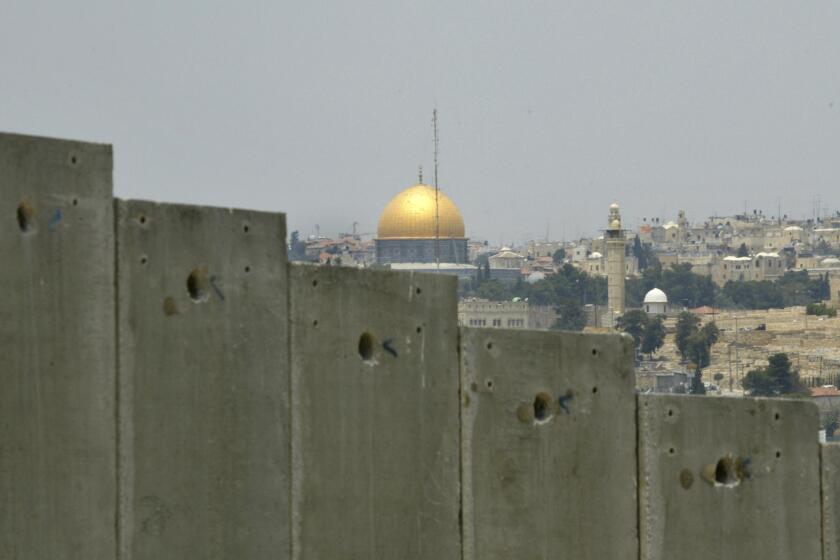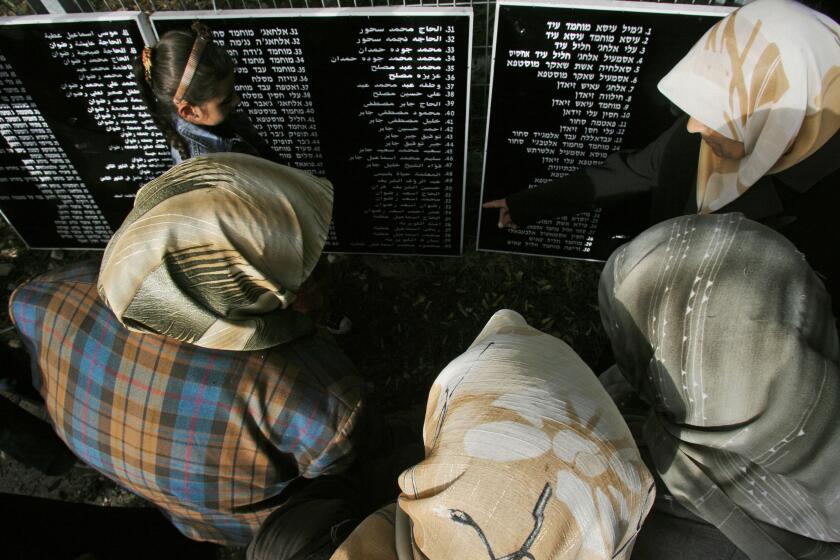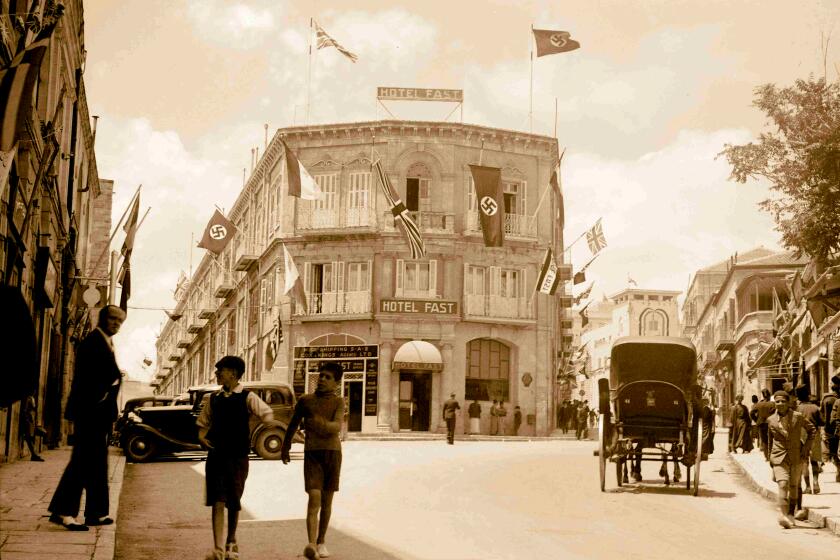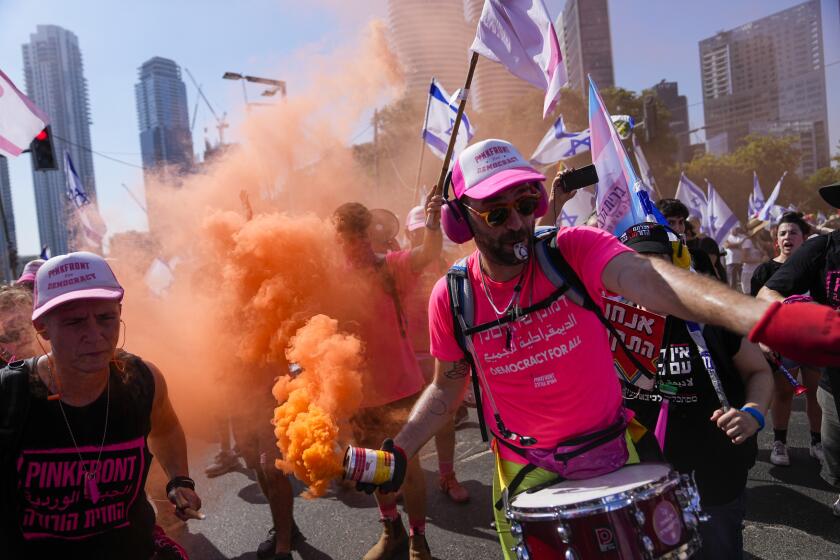How a California-born writer unveiled the tragedy of Palestine through one grieving father
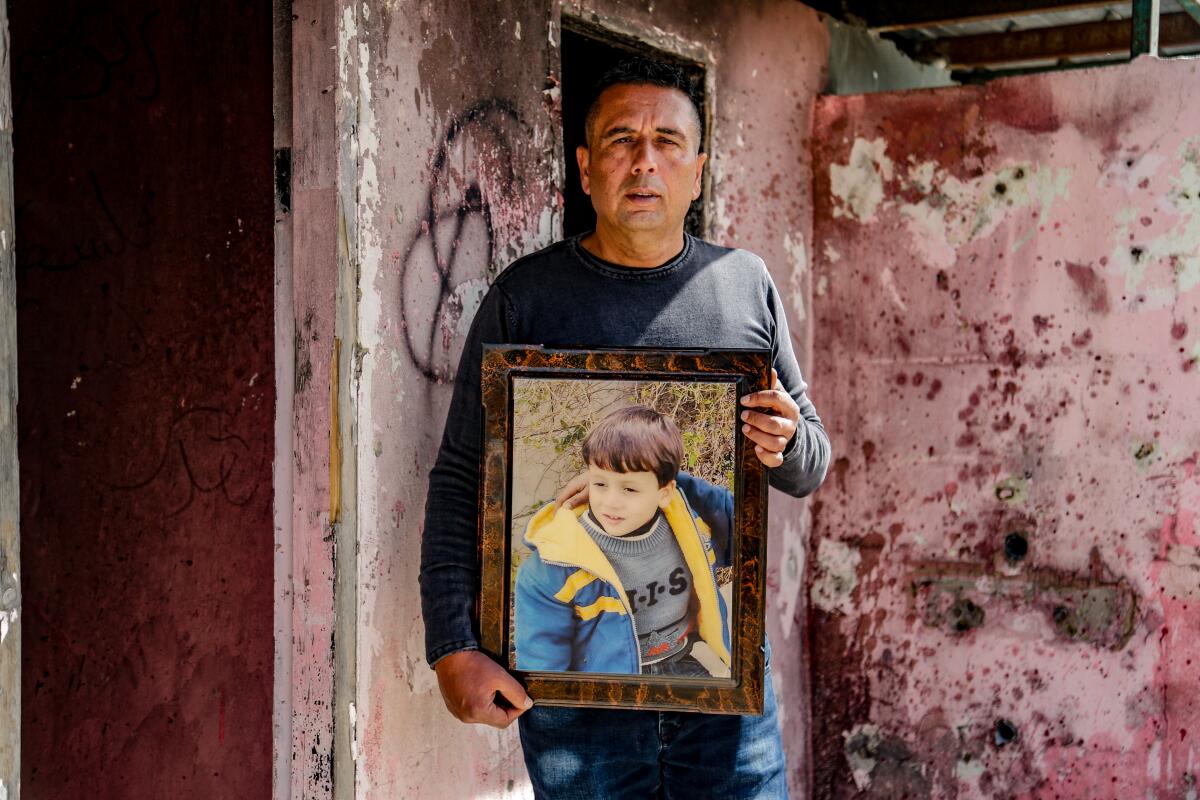
- Share via
On the Shelf
A Day in the Life of Abed Salama: Anatomy of a Jerusalem Tragedy
By Nathan Thrall
Metropolitan: 272 pages, $30
If you buy books linked on our site, The Times may earn a commission from Bookshop.org, whose fees support independent bookstores.
Sadly but perhaps fittingly, Nathan Thrall’s career as a journalist and the head of an NGO focused on Israeli-Palestinian relations began with a tragedy.
Growing up in the Bay Area, he had little knowledge of this seemingly eternal conflict. After college he was on a different path, living in Los Angeles and working in film editing, when an accident changed his life.
Thrall’s grandparents were driving home after visiting him in L.A. when his grandmother, distracted by a burst of sunlight, veered, then overcorrected and drove off the road and down an embankment. She died in the accident. “It’s a strange coincidence given the subject of my new book,” says Thrall, speaking by video from his home in Jerusalem about “A Day in the Life of Abed Salama: Anatomy of a Jerusalem Tragedy.”
An Israel-born critic was wary of Rebecca Sacks’ kaleidoscopic debut, ‘City of a Thousand Gates.’ Why she wound up loving it.
The book recounts a horrific accident on the outskirts of East Jerusalem in which a school bus filled with Palestinian schoolchildren was hit by a truck during a torrential storm. The bus was consumed by flames; six children and a teacher died while Israeli emergency and rescue workers failed to respond.
Thrall focuses on Salama, who is searching for his 5-year-old son, Milad; Salama cannot easily drive to the different hospitals where children were taken because of Israel’s travel restrictions for Palestinians beyond certain boundaries. The book weaves in stories of other families with children on the bus as well as others within these segregated communities, including Israeli settlers and those who helped draw those boundaries. There is also a cogent and concise history of the violence and many injustices that have marked life in Palestinians’ shrinking territories.
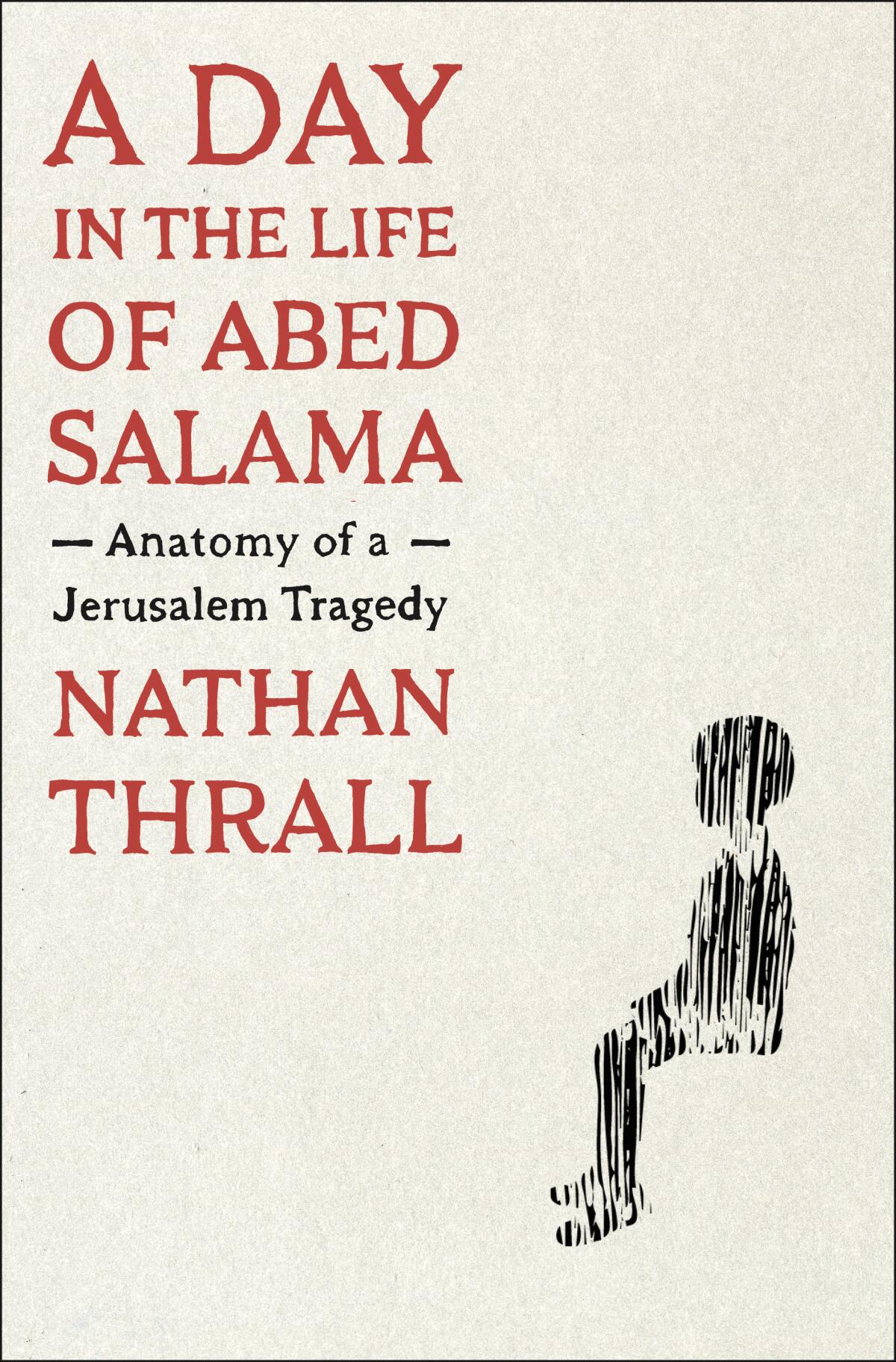
“The chief aim of the book is simple: to give people a visceral sense of what it is to live in this place,” says Thrall, 44.
He is only living in Israel himself because his grandmother’s death “totally upended my life,” says Thrall, whose previous essay collection was “The Only Language They Understand: Forcing Compromise in Israel and Palestine.” “I was very close to my grandparents, who were Soviet emigres,” he adds. “They raised me as much as my parents.”
Undone by his grandmother’s death, Thrall left his film editing job without a clear plan. Then his mother told him, “Your grandmother always had this dream of spending a year with you living in Jerusalem.” She suggested he honor her by going there on a free Birthright heritage program.
Documents about the massacre at Deir Yassin and other possible atrocities remain classified, apparently to cover up their “unpleasant” contents.
“I immediately was hooked, and when I came back I got a master’s in political science and then moved here and started working as a journalist,” he says — adding, however, that initially he was still “totally oblivious to Israeli-Palestinian history.”
At first he covered other topics, such as U.S.-Israeli relations, but once he learned the literal lay of the land, Thrall began writing about it with a nuance and a skepticism toward Israeli policies that make this book sure to infuriate more conservative American Jews.
“My grandmother would be pained by my writing about this place, as my mom is,” Thrall acknowledges, explaining that like many Soviet emigres, his grandparents started as Democrats but became staunch Reaganites, attracted by President Ronald Reagan’s strong “Evil Empire” anti-Communism. “They veered very far right. And they were very pro-Israel,” he says. “It’s in the realm of emotion more than the realm of reason.”
Thrall initially wrote about the accident as a feature story for the New York Review of Books in 2021, but with a different goal. “That was very much a political article with historical analysis and a desire to educate and explain the history of the settlements and how this system came to be,” he says.
But even as he was writing that article, Thrall planned to expand it into a book, which would allow him to refract that bigger picture through the people involved in the accident and their families’ histories. “My interest in the actual human lives ended up surpassing that initial instinct to use it as a vehicle to explain,” he says. “Telling these stories is essential for people to feel a human connection to what’s going on here.”
In ‘The Red Balcony,’ Jonathan Wilson weaves noir out of a time in Israel’s prehistory when ideologies and cultures clashed — just as they do today.
Not everyone agreed to speak with him for the book, but Thrall found that many of those grieving were eager to escape the “cloud of silence” that had descended after the bus accident. “Abed was hungry to talk about his son,” he says. “He referred to me as ‘the man who makes him cry,’ but he meant it in a good way — by talking about what happened he felt closer to Milad. Many of the conversations felt more like therapy than interviews. And then I’d come home to my wife and tell her what I’d heard and we’d both be weeping.”
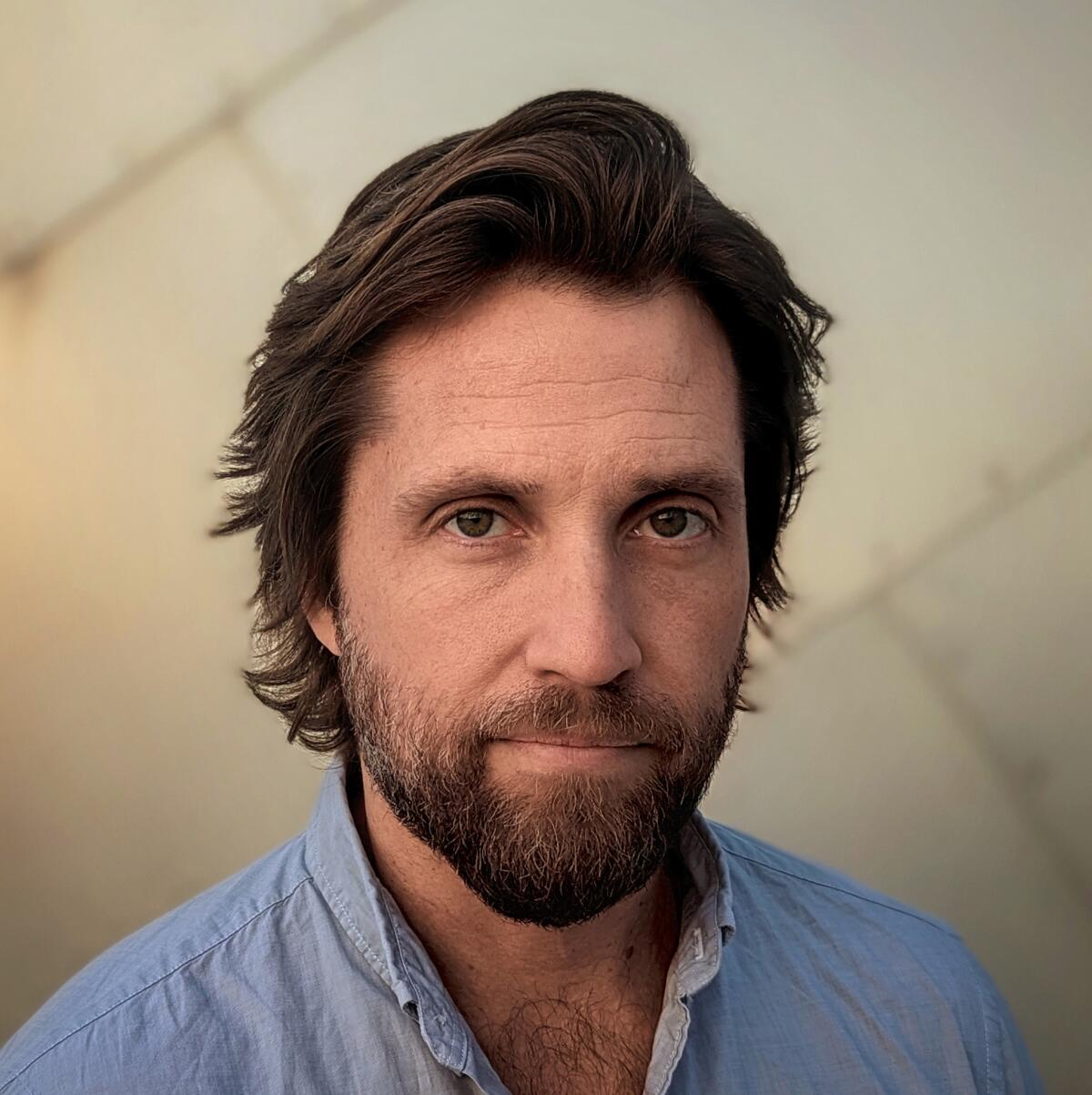
The book consciously avoids “black-hatted villains or saints,” portraying individual Israeli settlers as complex and thoughtful even as the movement is depicted as destructive, while also revealing a Palestinian movement stifled by bitter feuds and harsh family hierarchies. Thrall doesn’t even blame the Israeli rescue workers who did not respond to the accident, arguing that their failure “was not because anyone was heartless but because of the system itself.”
There are also mundane but powerful interactions between people from both sides: A Palestinian security official sees an Israeli soldier he’s befriended and stops to hug him in public, even though the soldier is on his way to a siege of Palestinian headquarters. In a hospital on the day of the accident, Palestinian mothers searching for their sons are comforted by a social worker who is a Jewish settler. Salama himself works for an Israeli phone company, though we see him turn down a repair assignment in a settler’s home, knowing it may jeopardize his job.
“These interactions are fraught for both sides — there’s a huge power discrepancy and all sorts of injustice — but the humanity people feel toward one another is evident throughout, which provides an abstract and indefinite kind of hope,” Thrall says.
Demonstrators blocked highways and gathered elsewhere in the latest nationwide protest against the Israeli government’s planned judicial overhaul.
Small signs of hope on an individual level are about as good as it gets right now, especially with the reelection of Israel’s hard-right government led by Benjamin Netanyahu. “It’s only getting worse, there’s no denying that,” Thrall says. “Pick any issue — home demolitions, settlement building, arrests, or the number of young Israelis with extremely right-wing and racist views — and all the trends look very bad.”
Not only does Thrall not believe there will be a sweeping solution in his lifetime; he feels that questions about it — “Is your version of utopia better or is mine” — are a distraction.
“A lot of my motivation for writing this book is to get us away from that,” he says. “Those ideas and talking points are far removed from the daily lives of the people here. I do hope that by conveying the reality of life here, the book can at least make some dent in the numbness there is right now.”
More to Read
Sign up for our Book Club newsletter
Get the latest news, events and more from the Los Angeles Times Book Club, and help us get L.A. reading and talking.
You may occasionally receive promotional content from the Los Angeles Times.
